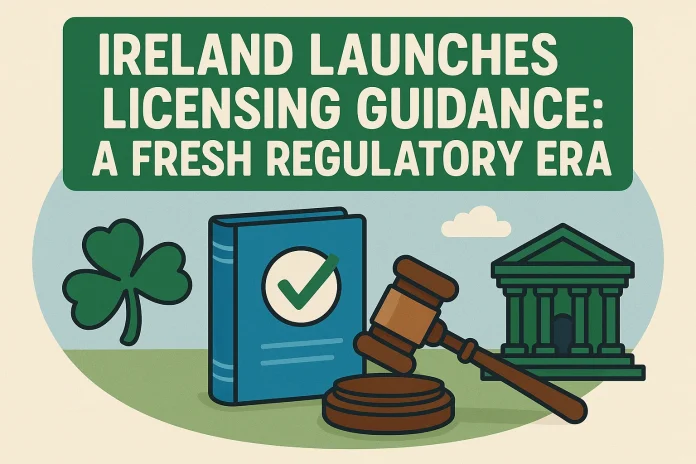On 10 July 2025, the Gambling Regulatory Authority of Ireland (GRAI) released its long‑awaited Licensing Application Guidance under the provisions of the Gambling Regulation Act 2024. This document marks a significant shift from piecemeal outdated frameworks to a unified, modern licensing system aimed at bringing clarity to both operators and consumers.
What’s in the Guidance?
The guidance sets out a clear seven-step application process targeting Business‑to‑Consumer (B2C) operators, including:
- Publishing a Notice of Intention at least 28 days before applying.
- Preparing detailed documentation covering corporate governance, financial status, compliance systems, and responsible gambling policies.
- Online submission through a dedicated portal, with a tiered fee structure based on turnover or projected revenue.
- Risk‑based review by GRAI, including due diligence and potential site inspections for in‑person operations.
- Ongoing obligations for licensees – annual audits, prompt reporting of ownership or staff changes, and maintenance of compliance systems.
Licences will roll out in phases. B2C licences – covering both remote (online) and in-person betting – are the first tier, expected in late 2025. B2B operator licences and charitable/lottery licences follow later.
Why This Matters for Online Gambling in Ireland
A Safer, Transparent Market
Operators will now face a structured regime, with oversight over everything from financial integrity to evidence of responsible gambling measures. The guidance mandates more than basic processes – it demands operators prove their ability to protect customers, especially vulnerable players. This should lead to:
- Reduced risk of rogue or offshore operators.
- Improved player protection through financial checks, audits, and compliance controls.
- A more trustworthy landscape, reassuring Irish players and authorities.
A Modern Regulatory Framework
The current legal framework under the Betting Act 1931 and Gaming & Lotteries Act 1956 was disjointed. The new system consolidates all gambling types: sports betting, casino, lotteries, remote and retail – under one roof. Noteworthy changes include:
- Definition of three licence types: B2C, B2B, and charitable/philanthropic
- A focus on remote licences which is key for online-only operators.
- Enhanced advertising controls, responsible gaming obligations, and oversight
Impact on Online Gambling Providers
Online betting and iGaming operators targeting Irish consumers will now need to secure a remote B2C licence from GRAI. The guidance outlines exactly what they must submit: company structure, financial proof, compliance practices, and more. Previously, many operated offshore with minimal oversight; now they’ll need formal approval.
Landing a licence may also unlock business advantages: Irish marketing, reputable branding, and fewer consumer trust issues. However, operators must adapt systems and policies to meet GRAI’s compliance standard.
Irish Gambling, Streaming, and Consumer Trends
Online gambling in Ireland has surged post-pandemic, with betting now split roughly 50:50 between physical and online channels. While streams of betting content have yet to develop to the scale of casino or slots streams like casinogrounds, there’s growing attention on streaming live bets or online casino play, especially through social platforms.
Streaming adds transparency; viewers see wins, losses, stakes and operator behavior in real time. Under the new licensing framework, operators facilitating streaming (e.g., integrating “watch while you bet” platforms) will likely fall under Remote B2C regulations. Licence holders must ensure that streamed content follows rules around advertising times, no inducements like free bets, and includes age checks .
Streamers themselves will need to consider how they fit into the ecosystem: are they independent promoters, paid by operators, or channels owned by operators? Each structure may trigger different compliance requirements.
Responsible Gambling Measures Embedded Early
The guidance aligns with broader GRAI priorities: consumer protection and harm reduction. Under the original Act and regulation framework, key measures include:
- Ban on targeted inducements and free bet offers.
- Advertising watershed: no gambling ads between 5:30 AM and 9 PM on TV or online
- Mandatory national self‑exclusion register, blocking tools, deposit limits, and reality checks
The licensing guidance reinforces this: licence seekers must outline how they enforce these rules, train staff, and audit compliance – moving responsible gambling from voluntary to foundational.
A Boost for Irish Gambling Culture and Watchers
For the public, a clear licensing system allows them to recognise licensed platforms, increasing trust and reducing risk. Over time, this may shift player habits away from unregulated offshore sites.
Gamblers who follow streams or watch online influencers will gain from this oversight. Licensed operators supporting streaming will need to show transparency, proper cooling-off features, and irreversible disclaimers – which should reduce misleading or aggressive promotion.
The launch of the National Self‑Exclusion Register and banking gambling-blocking initiatives (supported already by Irish banks) signal a shift towards consumer empowerment.
Final Analysis
The licensing guidance published by the GRAI signals a clear turn towards a regulated, trustworthy, and responsible online gambling market in Ireland. It sets strong expectations for operators and livestream partners, especially around streaming compliance, advertising limits, and consumer protection measures.
This process will likely play out through late 2025 and into 2026, shaping not just the legal obligations of operators but also the expectations of Irish players. As licensing begins, operators will adapt, consumers will watch more securely, and the Irish market will mature into a safer, transparent, and better‑regulated environment – fit for the digital age.

